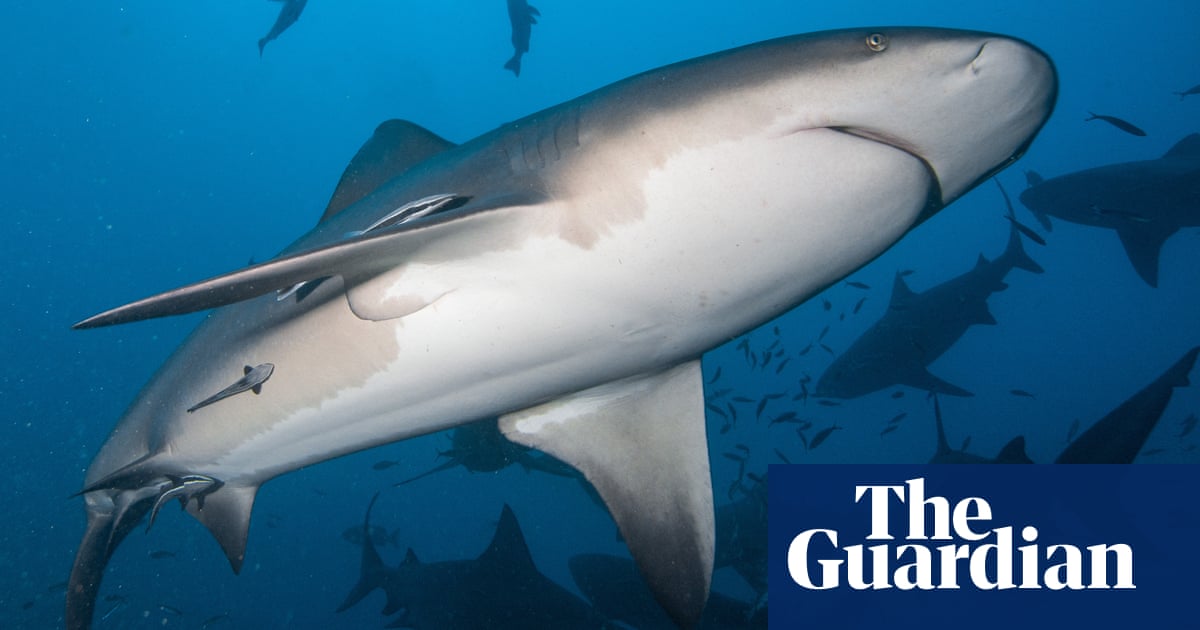Numbers of bull sharks, one of the largest and most aggressive ocean-dwelling predators, are thriving even as rising sea temperatures kill off other marine species, a study says.
Researchers at Mississippi State University (MSU) found that the number of individual sharks, all juveniles, recorded per hour in Mobile Bay was five times higher in 2020 than at the start of the study period in 2003.
The sea temperature there rose from an average 72.1F (22.3C) to 73.4F from 2001 to 2020, suggesting that bull sharks are beneficiaries of the climate emergency, according to the findings published this week in Scientific Reports. This news comes even as experts are warning of a “cataclysmic” mass-extinction event caused by record heat in the oceans.
“It’s a really exciting study because it’s sort of contrary to that narrative we normally think, which is that for many species, warming water is a detriment,” Lindsay Mullins, the study’s lead author from the university’s coastal research center, told ABC News.
“Despite these environmental changes that have been occurring on the Alabama coastline, such as urbanization and the warming waters over the last several decades, juvenile bull sharks have persisted and even grown during this timeframe.”
The MSU researchers analyzed data from 440 bull sharks caught, tagged and released by Alabama’s department of conservation and natural resources during the 17-year period, and matched it to climatic information collected by remote sensors in Mobile Bay.
The five-fold increase in abundance of bull sharks demonstrates the impact of changing environmental conditions, they say.
“As climate change persists, coastal communities will continue to change, altering the structure of ecological communities and the success of nearshore fisheries,” the report says.
Mullins also credits a robust and decades-long program of shark management by the National Oceanic and Atmospheric Administration (Noaa) for keeping numbers buoyant in the face of growing environmental challenges.
“The global outlook for sharks is still relatively grim because of overfishing, and unsustainable harvesting, being caught as bycatch,” she said.
“But the US is unique in that it has a really successful rebound story where sharks have been properly managed, and we’ve actually seen the recovery of a lot of species.”
Male bull sharks can grow up to 12ft (3.7 meters) and weigh 500lb (227kg), and are extremely territorial. The species was classed “vulnerable” by the International Union for the Conservation of Nature’s red list in 2020.
According to the University of Florida’s international shark attack file (ISAF), coastal-dwelling bull sharks are considered by many to be the most dangerous in the world, responsible for several dozen confirmed human fatalities globally, and suspected of countless other attacks.
Last month, a 16-year-old girl was killed by a bull shark in a river in Perth, Australia, and in January a woman was seriously injured while swimming in Sydney harbor.
The number of shark-bite deaths from all species doubled in 2023 to 10 from the previous year, a figure the ISAF research director, Gavin Naylor, called “unnerving”.
Despite the increased prevalence of bull sharks suggested by the MSU study, there is no parallel growth in the threat to humans, Mullins said.
“The increase in abundance is not going to lead to an increase in shark bites. People who read the article may be concerned [but] it’s important to remember that these changes in abundance are relatively gradual, and have been already increasing over the last several decades,” she said.
∎